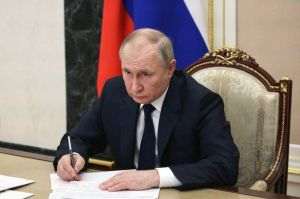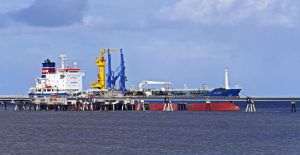• Interview with Mihai Bogza, the chairman of "Bancpost"
Reporter: Mr. Chairman, will the financial turbulences create problems in Romania, and cause parent banks to pull money from their Romanian subsidiaries?
Mihai Bogza: It is extremely unlikely that banks would significantly lower their exposure to Romania in the near future, at least as long as Romania will remain a stable enough destination, and attractive enough for their investments.
To the extent that the past guarantees what will happen in the future, the numbers are conclusive. According to data published by the NBR, between September 2010 and September 2011, the balance of nongovernmental credit, namely of lending to the population and companies, rose 6.5%, and the balance of governmental credit, namely loans granted by the banking system to government institutions, rose 20.5%. The increase is significant, considering that the total volume of deposits has increased by only 6.6%. And as we know, banks with foreign shareholders own more than 85% of the total assets, which means that without them this increase wouldn't have been possible.
Furthermore, Romania's foreign debt, over the same period, September 2010/September 2011, has reached 97.8 billion Euros, up 9.8%. These figures show that over the last year, banks have remained active when it comes to lending, moderately on the government market and more on the government market.
Reporter: There are however plenty of reasons to be concerned about the future, seeing, for instance, the suggestions recently made by the Central Bank of Austria...
Mihai Bogza: We should rather be pro-active than pessimistic. What I mean is, as a banker I would compare the attitude which potential investors, including international banks, have about Romania, with how depositors view a bank. You can't force customers to keep their money in a bank that they don't trust, you have to convince them that the bank is safe, that deposits aren't in danger and that the yield is good.
Similarly, Romania needs to convince foreign banks which have subsidiaries here that we are an efficient economic environment, which is safe and stable enough, and that the profits that foreign banks could make here would remain adequate. I say that knowing full well that in the first nine months of 2011 the Romanian banking system posted a loss. Let's not forget that all banking investments are long term rather than circumstantial.
And Romania needs to create this positive perspective.
I said that a bank must ensure its stability and solidity and convince its depositors of those two elements. A country must behave the same way when it comes to investors. Romania still has a lot to do in this respect, even though it has achieved some very good results in this respect over the past few years.
When it comes to solidity and stability, Romania has succeeded in securing several "safety belts" during this troubled time. The first would be a comfortable currency reserve of the Romanian National Bank of over 32 billion Euros. Then we have the minimum mandatory reserves - 15% in lei, 20% in currencies - which obviously lower the profitability of the sector, but at the same time, represent a liquidity reserve which could help Romanian banks avoid being affected, at least in the short term, by the potential deposit withdrawals, like it is happening in other countries.
Romania has also succeeded in drastically lowering its public deficit and owns treasury reserves which allow it to not depend in the short and immediate term of the exaggerated fluctuations of the price of the country's bonds. I've recently read that the Ministry of Finance has afforded itself the luxury of refusing to issue bonds denominated in US Dollars because it did not want to pay a price that it considered excessive.
Finally, Romania has a "precautionary" agreement with the International Monetary Fund and with the European Union, which, in an extreme situation, would allow it to use part of those funds to finance its balance of payment and budget deficit.
All of these safety measures come at a price, just like for a bank, it is costly to maintain surplus capital, but its benefits in times of crisis far outweigh the costs. Just to continue drawing a parallel between the state and banks, during this period of crisis, "Bancpost" has had a level of capital adequacy above the average of the banking sector, which was still true on September 30th, 2011. In spite of this, we are in the process of performing a share capital increase of about 20 million Euros, because, even though capital comes at a cost, we want to remain very stable and solvent.
Also during this period, our ratio between the deposits attracted from customers and the loans granted to customers was above the average of the banking sector. We currently have such a ratio and we plan to maintain it, because we are a local bank and we do not want to depend on foreign sources.
Once again speaking of Romania' situation, not only has it ensured for itself these safety nets for which many more developed countries envy it, but it has also seen an undeniably positive evolution of the macroeconomic indicators lately. This year, the authorities are expecting to reach a budget deficit of 4.4%, and for next year we are expecting a budget deficit substantially lower than 3%. Also, Romania has succeeded in bringing the current account deficit of the balance of payments close to 4%, and inflation has reached 3.5%. These elements are positive. However, foreign investments in Romania fell about 50% YOY. In other words, less than 50% of the current account deficit, low though it may be, is financed through foreign investments, and the rest is financed using credit. It is clear that even though Romania did a lot of things, in the vision of investors, who are concerned about the evolutions on other markets, it has not yet done enough.
Take for instance the qualitative component of the budget deficit. This has remained precarious because it has not financed any growth measures for the future, nor has it generated any improvements of the infrastructure, it has just temporarily ensured the trend for balance through austerity measures.
Similarly, the country's economic growth, which was remarkable in the third quarter (4.4% YOY), was for the most part the result of the basis effect. It is highly unlikely that the factors which supported this growth - agriculture and exports - will play a role just as significant in the future. Normally, a good agricultural year is very rarely followed by an exceptional year that would provide further growth. And as long as countries which are Romania's most important export markets - namely countries in Western Europe - are either expecting entering recession or at the very least a very low economic growth, it is highly unlikely that exports will continue to grow at an accelerated pace.
In closing, I would say that the progress towards ensuring macro-stability is real, but it is still fragile, and the Romanian economy has not yet succeeded in achieving a growth rate high enough to convince everyone that the recession is behind it. Let's not forget, investors don't only compare Romania with other European economies, but with the economies of Asia, for instance, or with those of South America, which are very dynamic.
Reporter: Is the suspension of the president influencing us in any way?
Mihai Bogza: Investor perception follows a different logic than political games, even if they are eventually an expression of the rules of democracy. It is possible that part of the fears of investors are related to Romania's inability to maintain the course of reforms, including due to a potential political instability. We all remember that the head of the IMF mission to Romania, Jeffrey Franks, mentioned "political noise" as the main threat for Romania, meaning those contradictory messages sent by politicians and which create the perception that Romania's macroeconomic achievements can be reversed very quickly.
I think that right now, Romania doesn't need negative signals.
Populist ideas such as the immediate increase of wages, the raising of the pensions, lower taxation, without the sources that would allow these relaxations to take place, are, in my opinion, only a part of that "political noise", without any chance of becoming real at this moment, but which can be very harmful in terms of how we are perceived abroad. It is obvious that everyone wants to live better, but no one can live beyond their means. As long as Romania has deficits, be it public or foreign, they have to be financed. Theoretically, a country can default with a minimal deficit, of 0.1% of the GDP, if it doesn't find financing sources for it. As a result, Romania, which at the moment, due to market anxiety among other things, (look at what's happening in the bond auctions of Italy, Spain, even Germany), needs to lower its deficit to a completely reasonable level.
Reporter: Which measures could help relaunch economic growth?
Mihai Bogza: There is no miracle solution. There is however the solution of constructive dialog between the authorities and market players, players who, in a more or less organized manner, are trying to propose ideas. For instance, I have the honor of serving on the Board of Directors of the Council of Foreign Investors, which last year presented a program intended to accelerate economic growth which included 80 proposals and which has been discussed at length by the authorities.
Reporter: Were any of the 80 measures been implemented?
Mihai Bogza: 11 of them were fully implemented; 16 others were only implemented partially, for now. The Labor code for one, just to give an example, was changed, but not as radically as the Council of Foreign Investors requested. Some progress has been made, it is better than it was before, but it is not perfect. But the positive effect of the new Labor Code is undeniable, because, according to the government statistics, the number of employees increased significantly after its implementation.
The importance of continued dialog of the authorities with the professional associations is obvious. The Council of Foreign Investors is probably the organization which brings together the most important companies which invested in Romania and the government should obviously take heed of their signals. Romania needs investments, whether they are domestic or foreign, and investors need a friendly economic environment to generate jobs and improve the living standards.
Reporter: What is your opinion on the operations of Bancpost in this period?
Mihai Bogza: Ever since the onset of the crisis, when we didn't know how long it would last, we announced that we would be focusing first and foremost on ensuring the stability and the solidity of the bank and less on making a profit. And we have also been saying, since then, that, even though it is hard to make a strategy, even a short term one, for a bank, in a time like this, we will have a few core elements that will not be changed during the crisis.
First of all, we have decided to bear the costs of the crisis together with our customers. As a result, we have offered loan restructuring facilities to customers acting in good faith, but who were nevertheless having problems repaying their loans. Also, we have demonstrated frugality ourselves, by reducing the bank's operating expenses by about 20% in the first years of crisis and by continuing to do so this year as well. We are actively managing our loan portfolio, in order to mitigate as much as possible the negative effects which the crisis had on it. And lastly, we want to maintain the solvency above the average of the banking sector. We have never strayed from these principles and we will preserve them as long as the crisis will last.
All this time, we have tried to remain active on the lending side, amid reduced demand, unfortunately, because our customers and ourselves have become more cautious.
Reporter: Which lending segment is still doing well at the moment?
Mihai Bogza: Mortgage and corporate loans, for certain niche companies, and to a certain extent, there is a certain level of demand for credit cards. People are wary of consuming too much, in a time when they are not sure of being able to keep their jobs or about the level of their future income.
Also, companies are cautious when it comes to borrowing, because the future of aggregate demand remains uncertain.
Reporter: How do you feel about the creation of the bridge bank?
Mihai Bogza: In my opinion, the creation of this legal possibility of allowing the bank Deposit Guarantee Fund (FGD) to take over troubled banks is a positive factor. Some time ago, I was the president of the Board of Directors of the Bank Deposit Guarantee Fund. All the Fund could do back then was to wait for a bank to be declared bankrupt and then compensate all of the secured debtors. The Fund would subsequently attempt to recoup the money by liquidating the bank. It was a rather costly process, and bankruptcies were fueling customers' distrust of banks, but at the time legislation did not allow other solutions, and doing so would have probably been premature for Romania's degree of economic maturity at the time.
By creating such a bank, instead of spending all its money on compensating depositors, the BDGF would keep a troubled bank alive, replacing the existing shareholders, and only contribute the remaining amount needed by the troubled bank. This way, the net expenses of the Fund would be significantly reduced, allowing a multiplier effect when it comes to using resources. The benefits of this bridge-bank can be understood by looking at the case of the Northern Rock bank, which was nationalized in 2007 by the British authorities. In order to avoid bankruptcy, they have injected the equivalent of 1.2 billion Sterling Pounds into the bank, and they have later sold it to a private investor for about 750 million Sterling Pounds. The net loss was minimal, because the cost of compensating all of the banks' depositors would have reached approximately 20 billion pounds, not to mention the effects which the ensuing panic would have had on the entire banking system.
Reporter: Do Romanians still trust banks?
Mihai Bogza: Yes. I have to say unhesitatingly that yes. Up until now, Romania has not yet faced deposit withdrawals, quite the contrary, they have increased. Because there is a certain level of confidence in Romanian banks and in the ability of the NBR to adequately oversee them, and because of the fact that, in an extreme situation, the Bank Deposit Guarantee Fund would be able to repay the money. The creation of the bridge bank will enhance this confidence.
But like I said, in times of crisis, it is a good thing to have several safety nets. In this respect, I have recently proposed to the Ministry of European Affairs, to use the part of the European grants left unspent for the additional capitalization of the Bank Deposit Guarantee Fund. I hope that this personal initiative will be supported by the banking community and by the NBR alike.
I have to remind that the Bank Deposit Guarantee Fund is created according to the European regulations, intended to guarantee the deposits of individuals and companies (small and medium enterprises) and to compensate their owners if they ever become unavailable, up to the limit of the equivalent of 100,000 Euros per individual depositor. The Fund is created through the contributions of the participating lenders and is led by a Board of Directors which includes members of the NBR, the Ministry of Finance, the Ministry of Justice and the Romanian Banking Association.
The current resources of the Bank Deposit Guarantee Fund currently amount to the equivalent of about 500 million Euros. The amount is considerable, but like I said, under the current circumstances, it is a good thing to have as many safety nets as possible. The fund is funded by annual contributions of the banks, of up to 0.3% of their deposits. These contributions amount to a little over 100 million Euros a year, meaning that the amounts available to the Bank Deposit Guarantee Fund can not grow considerably in the short term.
Right now, the odds of Romania fully using the grants of the EU by the deadline are basically non-existent. Because of this, Romania should identify "out of the box" solutions for accelerating the drawing of those funds, including by making requests to reallocate certain amounts to areas which were not taken into account at the time of the initial allocation, but which later became important in the context of the current crisis. The increase of the resources available to the Bank Deposit Guarantee Funds by 500 million - 1 billion Euros would be very important in helping Romania avoid the effects of the crisis. The absence of a precedent in this respect should not represent an impassable hurdle: during the crisis, the European authorities have passed a series of unusual measures affecting the financial sector, which would have been inconceivable a few years ago.
First of all, this initiative would reduce the risk of panic in the banking system, by enhancing the intervention ability in the case of a negative event and would improve the country's financial stability. It would also allow the quicker use of European funds and would facilitate the financing of the state budget at lower costs, taking into account the fact that most of the resources of the BDGF are invested in government bonds until the time of their effective use.
Reporter: Is it still safe for Romanians to keep their money in banks?
Mihai Bogza: From my point of view, the banking system is extremely solid. Personally, I keep my savings in bank deposits, in lei or in foreign currencies.
Moreover, the rewards for doing that are adequate as well, because the interest rates on deposits are already exceeding inflation. It's obvious that Romanian will never get rich just by living on interest, but, in real terms, they will be able to protect their deposits and turn out a small profit; 1%- 2% is what you can expect from the banking system.
If anyone wants to make a higher profit, they need to take on the risk of making investments, on the stock market or in personal businesses. For those who only want to protect their savings, then, I repeat, bank deposits are the best solution.
Reporter: Thank you!
























































